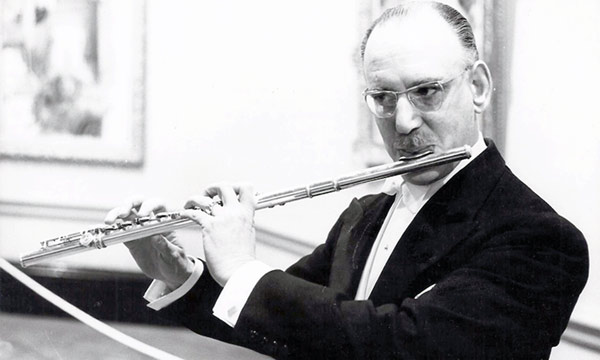 At the time of his death, The London Times described Geoffrey Winzer Gilbert as “the most influential British flautist of the twentieth century”
At the time of his death, The London Times described Geoffrey Winzer Gilbert as “the most influential British flautist of the twentieth century”
From day one, music was a part of Geoffrey Gilbert’s life. He was born in Liverpool, England, on May 28, 1914, to Welsh parents. His father, Ernest, was a professional oboe player, and his mother, Jessie (Thomas), founded and ran a small private school that taught “all of the diverse subjects you would need for office work.”
Geoffrey and brother Tom were taught by their parents and had no formal education. But when the inspector came round every six months to test the children on reading, writing, and arithmetic, he found them to be very competent. Geoff’s “formal” education lasted through age 12, but his musical activities started much earlier (age 6) playing a tin-whistle. He quickly graduated to a simple piccolo, then flute and oboe, and Tom started to learn the clarinet. There was lots of time to practice with good supervision from Ernest!
At age 10 he gave his first performance, The Mockingbird by Frank Brockett, during a family holiday in a small village called Kirk Michael on the Isle of Man. Upon hearing the performance, a family friend suggested that young Gilbert pursue the study of flute.
ORCHESTRAL LPs
Among the recordings on which Gilbert played are several pre-war LPO sets conducted by Sir Thomas Beecham including a series of Mozart symphonies recorded across several years beginning in 1934, and – with Beecham and the Royal Philharmonic – symphonies by Haydn and Schubert, Rimsky-Korsakov’s Scheherazade, Richard Strauss’s Ein Heldenleben, works by Delius, and many French pieces, including Debussy’s Prélude à l’après-midi d’un faune with its prominent opening flute solo.
EMI Label
(Royal Philharmonic Orchestra)
Haydn Symphony #101
- RPO-Beecham, SXLP 30265
Haydn Symphony #103
- RPO-Beecham, SXLP 30257
- This has been reissued on CD on the EMI Classics for Pleasure label: CD-CFP 4530
Liszt Faust Symphony
- RPO-Beecham, SXDW 3022
- Re-issued on Seraphim S-6012
Rimsky-Korsakoff Scheherazade
- RPO-Beecham, SXLP 30152
- Re-issued on Angel RL 32027
Schubert Symphony #3
- RPO-Beecham, SXLP 30204
Strauss Ein Heldenleben
- RPO-Beecham, SXLP 30293
- Re-issued on Seraphim S-60041
Beecham Conducts French Lollipops
- RPO-Beecham, SXLP 30299
RCA Label
Brahms Symphony #4
- RPO-Reiner
Bartok Concerto for Orchestra
- RPO
Delius’ Brigg Fair
- Seraphim, S-60185
Listen…
A recording of a rare work by Debussy, “Cortege” with principal flute, Geoffrey Gilbert playing the gorgeous solos. Gilbert joined the RPO and Sir Thomas Beecham in 1957 and remained with the orchestra until Beecham’s death.
Albert Cunningham was Geoffrey’s next teacher who taught at the Liverpool College of Music where Gilbert had been awarded a scholarship. For the next couple of years Gilbert utilized his emerging talent in the entertainment field: amateur military bands (the David Lewis Military Band), amateur operatic societies, musicals, skating rinks, circuses, and an occasional cinema job.
His talent was such that at age 14 the union made him an honorary member, allowing him to once again play in a cinema orchestra. Gilbert’s cinema job, coupled with a music scholarship, enabled him to pay tuition at Manchester’s Royal College of Music, where for three years he was under the tutelage of Joseph Lingard, Principal Flutist in the Hallé Orchestra. During this three year period of study, Gilbert’s memory was that all he worked on in lessons were grueling études − Anderson, Soussmann − and he played very few pieces (only Chaminade’s Concertino and Bach’s Musical Offering). Around 1929 he lost his cinema orchestra pay when the silent cinemas met their demise with the advent of “talking” pictures.
Between 1930 and 1969, Gilbert gained the reputation of being one of the most celebrated flutists in England. In 1969, Gilbert accepted a position as Director of Instrumental Studies at Stetson University in DeLand, Florida. Stetson had attempted to entice him several times, but when his wife, Marjorie, was offered a position teaching speech and drama, the two decided to settle in America. While living in the United States (1969 to 1989) and lecturing throughout the world, Geoffrey Winzer Gilbert achieved world-wide recognition and high acclaim as a teacher of American flutists.

